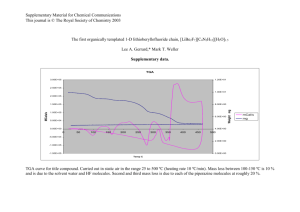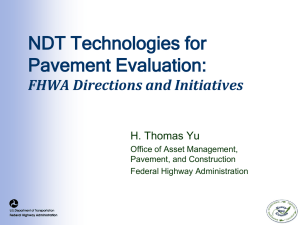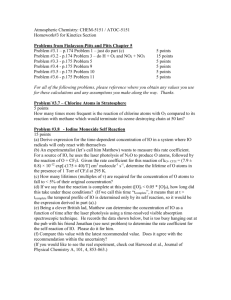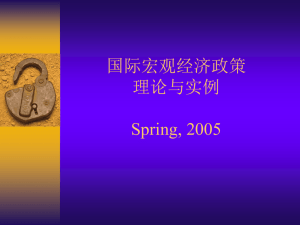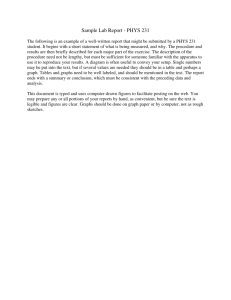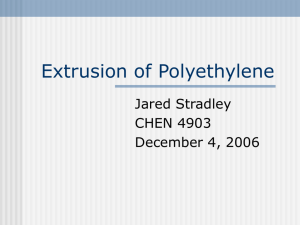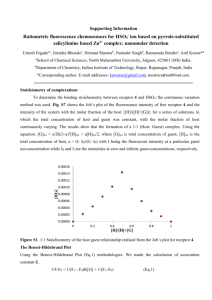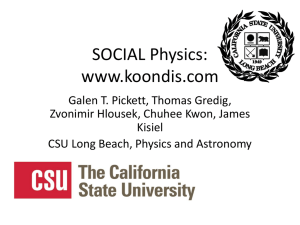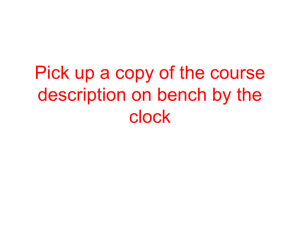DoeWellTesting
advertisement
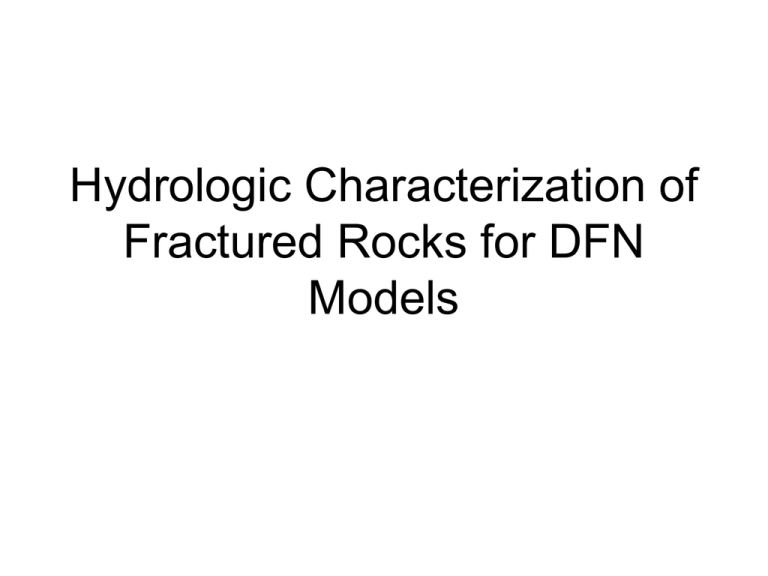
Hydrologic Characterization of Fractured Rocks for DFN Models Useful Definitions and Concepts • Transmissivity -- Properties of a conductor (aquifer, reservoir, single fracture, fracture zone) (L2/T) • Permeability, Hydraulic Conductivity -Property of material inside conductor (L/T) Definitions, continued • Storativity -- Storage of a conductor or conducting feature (dimensionless) • Specific Storage -- Property of material in a conductor (1/L) • Hydraulic Diffusivity -- Ratio of T/S (L2/T) – Controls speed of propagation of pressure effect of a disturbance – Very (!!!) important for scaling results Overview • Useful Concepts • Steady Flow Methods – Packer Tests – Flow Logs • Transient Flow Methods – Boundary effects – Dimension effects Steady Flow Methods • Packer Testing – Falling Head Test – Constant Pressure/Lugeon Test • Flow Logging – Heat pulse – Spinner – Hydrophysical Steady Radial Flow rw • Pressure and flow constant • Only exists with constant pressure boundary • Generally underestimates due to skin R ln( R rw )Q Q T 2 π h h Packer Test (Fixed Interval Length) • Used in Civil Engineering • Testing at fixed interval lengths • Some zones have no fractures; some zones have multiple fractures • Efficient testing has some no flows but Pn - # of no flows/# of tests L - length of test zone ln( Pn ) P10 L Oxfilet (Osnes Extraction of Fixed Interval Length Evaluation of Transmissivity) • Guess T and P10 of Fractures • Oxfiet generated fracture along hole • Oxfilet calculates packer test transmissivities • Oxfilet compares measured and simulated pacer test transmissivities Fracture Network Stats Packer Test Stats Oxfilet Interface Data and Simulated PDF’s Data and Simulated CDF’s Oxfilet Challenges • Results non-unique but constrained (range of combinations of distributions of T and frequency that will fit a test • Flow logging preferred method Flow Log Types • • • • Spinner Heat pulse Hydrophysical Induced electromagnetic Spinner Hydrophysical Log (1) Replace fluid with deionized water (2) Log fluid resistivity while pumping UCM (Electromagnetic Log) Well Name: KI0025F02 File Name: C:\WELLMAC\WELLDATA\ASPO\TRUE\KI025F02.HDR Location: ASPO HRL, TRUE Block Scale Elevation: 0 Reference: Ground Surface Date: 98-09-01 UCM Probe:9302 Metres 0 Flow 0 (l/min) Temp 60 16.2 (Deg C) Fluid_Res 16.8 0.75 (ohmm) 2 -50 Fluid Resistivity -100 Flow -150 Temp -200 Posiva (Finland) Heat Pulse Flow Log (Äspö) Heat Pulse Log FLOW RATE AND SINGLE POINT RESISTANCE LOGS DEPTHS OF LEAKY FRACTURES ÄSPÖ, KI0025F03 120 121 122 123 124 124.65 125 125.45 126 127 128.3 Depth (m) 128 129 130 131.1 131 132 133.3 133 134 135 136 137 138 139 140 1E+1 1E+2 1E+3 1E+4 Flow rate (ml/h) 1E+5 1E+6 1E+1 1E+2 1E+3 Single point resistance (ohm) Thoughts on Flow Logging • Cumulative logging methods fast and easy • Discrete interval logging methods provide better detail and wide range of distribution • Complementary temperature and fluid resistivity can be useful Image Logging Borehole TV (BIPS) FMI (micro-resistivity) Hydro-Testing Work Flow • Steady tests (flow log) to identify conductors • Image log or core analysis to geo-logically characterize conductors • Transient tests to characterize network away from hole 4.00E+00 3.00E+00 Dimensionless Pressure 2.00E+00 1 1.00E+00 2 0.00E+00 -1.00E+00 3 -2.00E+00 -3.00E+00 -2.00E+00 -1.00E+00 0.00E+00 1.00E+00 2.00E+00 3.00E+00 Dimensioness Time 4.00E+00 5.00E+00 6.00E+00 7.00E+00 Transient Well Tests Overview of Transient Tests • Important source (most important?) of geometric information on fracture plumbing system • Cylindrical flow and beyond • Dimensions, boundaries, and reading derivative curves Radial Diffusion Equation (Radial Cylindrical Flow) 1 h 1 h r r r r t Exponential Integral: r2 q e x q p( r , t ) dx Ei 4T r2 /( 4t ) x 4T 4t Semilog Approximation of the Exponential Integral u2 u3 u4 Ei( u ) 05772 . ln u u ........ 2 2 ! 3 3! 4 4 ! q 2.246t p( r , t ) 2.3026 log (MKS units) 2 4T r PressureDerivative: dp constant d (log t ) Exponential Integral Function Semilog Log-Log 100 10 14 12 log pD 10 pD 8 1 6 4 0 2 -2.00 0 -1.00 0.00 1.00 2.00 3.00 4.00 5.00 6.00 7.00 log tD -2.00 0 -1.00 0.00 1.00 3.00 2.00 log tD 4.00 5.00 6.00 7.00 Derivative Methods • Plots P/log(t) • Intent to make semi-line unambiguous • Effect is a very powerful tool to interpret geometry from tests • Derivative is a map of transmissivity versus distance from the well • Shape of derivative constrains network geometry Exponential Integral and Derivative 100 log pD 10 1 0.1 0.01 0 5 10 15 20 log tD 25 30 35 Calculating Pressure Derivative in Spreadsheets 5 6 7 8 9 10 11 12 13 14 15 A B C Time Head or Pressure Change Derivative 2.33E-02 6.15E+01 2.47E-02 6.37E+01 3.68E+01 3.16E-02 7.38E+01 4.47E+01 3.98E-02 8.52E+01 5.27E+01 4.67E-02 9.39E+01 5.72E+01 5.08E-02 9.86E+01 5.78E+01 6.32E-02 1.13E+02 Formula in Cell C8: t p/ t, or approximately6.89E+01 7.96E-02 1.30E+02 7.95E+01 =a8*(b9-b7)/(a9-a7) 9.46E-02 1.44E+02 8.69E+01 If the derivative is noisy, calculate derivative over a larger spread, for example, at C7 calculate using rows 10 and 8.23E+01 4 9.73E-02 1.46E+02 1.03E-01 1.51E+02 154.4430288 Note: Averaging deteriorates at beginning and end of data especially if a larger is used Dimensionless Variables (Radial Cylindrical Flow) 1 4t Dimensionless Time: t D 2 u r 2T Dimensionless Pressure: pD p q Useful Definitions T transmissibility = kh / ( L5 / FT ) T * transmissivity = K * h ( L2 / T ) S storativity = ct h ( L2 T 2 / M ) diffusivity T / S ( L2 / T ) viscosity ( FT / L2 ) porosity (-) ct compressibility ( L 2 / F ) S s specific storage = S / h ( LT 2 / M ) K conductivity = gk / Generalized Radial Flow p (r , t ) 4 1 n / 2 qr n/ 2 2 n Kh 3 n ( v , u ) Dimension Information from Well Tests 4.00E+00 3.00E+00 Dimensionless Pressure 2.00E+00 1 1.00E+00 2 0.00E+00 -1.00E+00 3 -2.00E+00 -3.00E+00 -2.00E+00 -1.00E+00 0.00E+00 1.00E+00 2.00E+00 3.00E+00 Dimensioness Time 4.00E+00 5.00E+00 6.00E+00 7.00E+00 Integer Flow Dimensions Linear Flow: e u p (r , t ) erfc u 2 2 Kh u qr Cylindrical Flow q p (r , t ) Ei u 4Kh Spherical Flow q p (r , t ) erfc u 4Kr Spherical (3-D) x-section area r2 Generalized Flow, x-section area rn-1 Linear (1-D), x-section area r0 Cylindrical (2-D) x-section area r1 Log Slope and Dimension For Log Plots of Pressure or Inverse Flow Verus Time Log Slope = = 1 - n / 2 1< n < 2 For Log Plots of Pressure or Inverse Flow Derivative Log Slope = = 1 n / 2 For all n Boundary and Dimension Effects 1-D 2-D 3-D Reservoir geometry Network/Flow geometry Fracture Intensity (Fracture Area/Rock Mass Volume) Can Influence Dimension 100 .06 10 Head, meters 0.1 0.1 0.175 1 0.25 Boundary Effect 0.5 0.1 0.1 1.0 10.0 Time, seconds 100.0 1000.0 Geometric Information From Well Tests 5 Lower Intensity, Smaller Fractures = Low Dimension, Compartments Log Drawdown (m) 4.5 4 3.5 3 Near Field Domain 2.5 Domain Boundaries 2 High Intensity, Large Fractures = High Dimension, Good Boundary Connections 1.5 1 0.5 0 -2 -1 0 1 2 3 Log Time (s) 4 5 6 7 Composite Dimension 1.00E+03 Dimensionless Pressure 1.00E+02 Composite Boundary 1.00E+01 Linear Flow 1.00E+00 Spherical Flow 1.00E-01 1.00E-02 1.00E+00 1.00E+01 1.00E+02 1.00E+03 1.00E+04 Dimensionless Time 1.00E+05 1.00E+06 1.00E+07 1.00E+08 Comments on Interference Tests • Radius of Investigation (very handy !!!) • Estimate diffusivity from response time • Independent of dimension r 2 t Important Notes on Tests • Transmissivity can be determined only from pumping wells in fractured or heterogeneous rock without assuming uniform flow over region of influence • Storativity (diffusivity) can only be obtained from observation responses • Observation wells give geometric information for areas farther from pumping source than themselves Composite Dimension • Dimesional Variation Reflect Local Scale versus Larger Scale Effects • May Reflect Borehole Geometry as Well as Conductive Geometry Parts of Composite Dimension Curves • Early Time Effects (Wellbore Storage, Finite Borehole) • Inner Shell (n1) • Transition (changes in area, property) • Outer Shell (n2) • Boundary Effects Composite Interference Response • Response depends on relative distances of transition radius and observation well radius • Inner zone not observed for observation points near or beyond the transition radius Rd=1, n1=1.5, n2=2.5 Dimensionless Pressure 1E+2 1E+1 1E+0 1E-1 1.00E+00 1.00E+01 1.00E+02 1.00E+03 1.00E+04 1.00E+05 Dimensionless Time 1.00E+06 1.00E+07 1.00E+08 Rd=85, RD1=100, n1=1.5, n2=2.5 Dimensionless Pressure 1E+2 1E+1 1E+0 1E-1 1.00E+02 1.00E+03 1.00E+04 1.00E+05 Dimensionless Time 1.00E+06 1.00E+07

